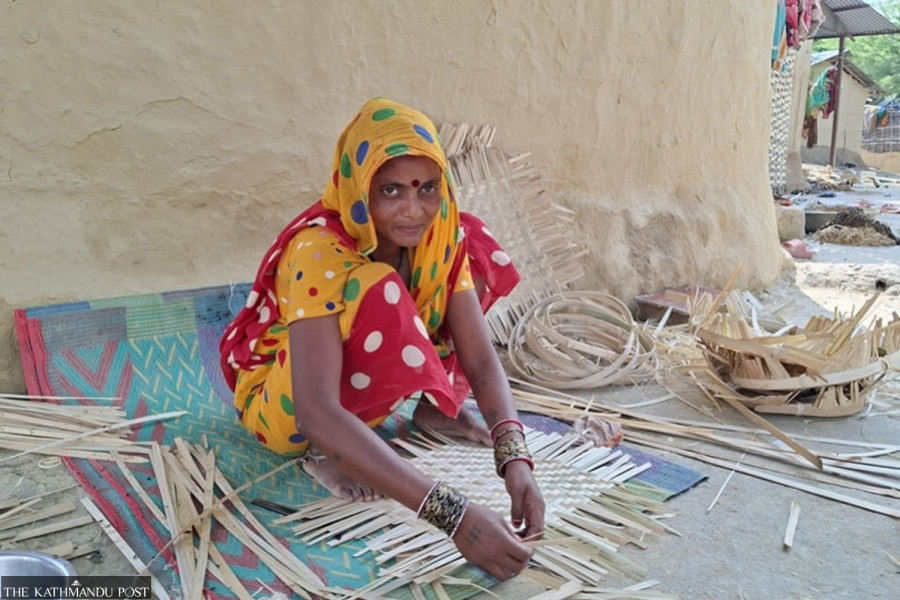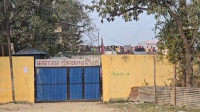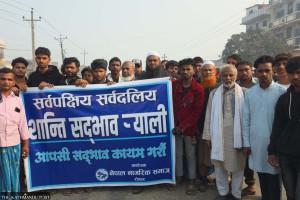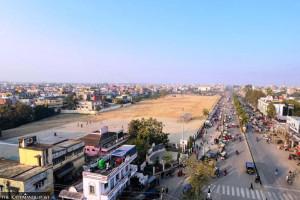Madhesh Province
Dom families in Siraha face eviction, assault and caste-based humiliation
Despite constitutional guarantees and legal protections, Madhesh’s marginalised Dom community continues to endure violence and untouchability.
Binay Aazad
The house of a Dom family living on public land for nearly three decades in ward 5 of Aurahi Rural Municipality, Siraha, was bulldozed on February 22 under the supervision of local officials.
The family of Deepak Mallik, who had been residing on the land for about 30 years, lost their home overnight when a bulldozer was used to clear the area. The demolition was allegedly carried out in the presence of Rural Municipality Chairperson Shivaji Yadav and former ward chair Dilip Yadav.
The stated reason for the demolition was that a Mahayagya (grand Hindu ritual) was to be held on the same land from March 30, and the organisers claimed the presence of the Dom family made the area “impure.” The concrete house, constructed under the provincial government’s Janata Awash programme, was torn down. Mallik’s eight-member family was forced to move to a temporary hut by the riverbank. In a shocking act of caste prejudice, even the soil from the site was dug out and thrown away, saying it was polluted.
The incident became public only after the Post published a report. The issue quickly drew national attention. Following public pressure, police arrested Chairperson Shivaji, former ward chair Dilip, and Bajarangi Baba, the main priest of the Mahayagya, on charges of caste-based discrimination and destruction of property.
The Siraha District Court released them on bail of Rs100,000 each and the case remains sub-judice. Amid criticism that the administration had ignored the issue despite being aware of it, then Chief District Officer Basudev Dahal and Superintendent of Police Ramesh Pandit were recalled to Kathmandu.
A few months later, another act of caste-based violence was recorded in ward 10 of Sukhipur Municipality. On September 4, 2025, Ganapati Mallik of the Dom community and his family were assaulted by neighbours who called them “untouchable.”
The family had been living for 15 years on public land along the Gagan riverbank after moving from ward 13 of Golbazar Municipality, where they had repeatedly faced discrimination due to their caste. When they first settled by the river, the area was sparsely populated. But as the nearby market and road developed, more people moved in, and new neighbours began threatening them, saying that living near an “untouchable” family would bring misfortune.
Despite repeated threats to leave, the family refused to move, leading to ongoing harassment and eventually physical assault.
Police have filed a case of caste-based discrimination against locals Sahdev Mahato, Sukdev Mahato, Nagendra Mahato, Dukharan Mahato and Shyamsundar Mahato. However, no arrests have been made so far, and the investigation has shown little progress.
Observers say these incidents highlight how the Dom community—listed among the most impoverished and marginalised castes in Madhesh—continues to face both social and institutional discrimination.
Ironically, the same community plays a vital role in fulfilling the cultural and religious needs of society. With the Chhath festival this month, the demand for bamboo items, essential for worship, has sharply increased. These materials are traditionally crafted by Dom families.
In ward 6 of Mirchaiya Municipality, 38-year-old Nirjala Mallik was seen weaving bamboo trays. She said she had not even taken lunch by 2pm. “During Chhath, there’s no fixed time for eating or bathing. We have to keep working,” she said. “A set of bamboo items sells for up to Rs700. Despite competition from brass, steel and plastic, the importance of bamboo has not faded.”
According to her, each family earns between Rs20,000 and Rs30,000 during the festive season, providing temporary relief to a community that remains jobless most of the year.
Still, Nirjala said that even though the law has banned untouchability, the practice persists. “Our handmade items are used to worship the gods, but we ourselves are treated as impure,” she said. “The world has moved forward, but society still refuses to see us as human.”
Community members said they face discrimination even during Chhath itself. “People of so-called upper castes do not allow us to worship at the same pond,” said local resident Binod Mallik. “If they do, they make us use a separate section, far away from theirs.”
The Dom community is not alone. Other Dalit groups in Madhesh, including Musahars, Chamars and Halkhors, also face social exclusion, humiliation and physical assault in villages, schools and markets.
“Such acts are not only inhumane but also punishable by law,” said Abhash Singh, patron of the Madhesh Library. He accused the state of nurturing caste discrimination instead of eradicating it. “Untouchability remains a dark stain on Nepal’s society,” he said. “The state bears the main responsibility because caste arrogance still dominates state institutions. Until the state becomes sensitive and accountable, this evil will not end.”




 19.57°C Kathmandu
19.57°C Kathmandu















